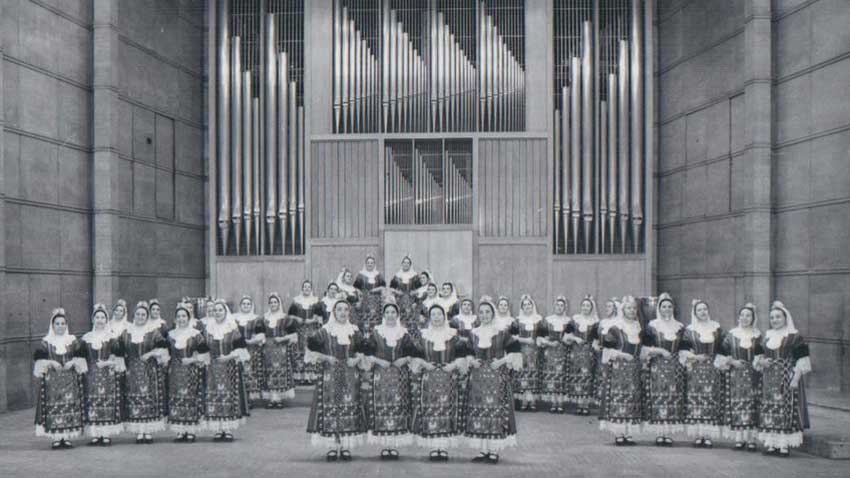The Philip Koutev National Folk Song and Dance Ensemble is one of the country’s musical symbols. Thousands are the concerts, dozens are the countries where the singers, instrumentalists and dancers have held audiences in rapture. We shall never know the number of people around the world who first heard the name of Bulgaria thanks to the first national ensemble of folklore music and dance. Set up in 1951, it now bears the name of its founder Philip Koutev. The Bulgarian National Radio Golden Fund audio archives have brought the words of the composer down to us as he takes us back to the beginning:
“A folklore ensemble was set up in Bulgaria in 1951 by a government decree. The reason why this was done was the Pyatnitsky choir which had a concert in Bulgaria in 1949, making a colossal impression. So, there were discussions that we should set up an ensemble of our own, in view of the wealth of Bulgarian folklore. I was commissioned to put this idea into effect. It was no easy task. I decided to bring together the most talented singers, dancers, instrumentalists from all folklore regions of the country. After that was done came the practical problems but they too were solved. The most important question I faced was which direction the ensemble should take. The first members were unqualified. I had made it a point of selecting natural talents because they are spontaneous, authentic. I chose songs with meaningful lyrics, pretty melodies and spectacular metrorhythmics from different regions in Bulgaria. We took folklore out of the museum and breathed new life into it. My strategic aim, after forming the ensemble, was to create a network of other such folklore ensembles across the country. Fortunately, this happened without instructions from the powers that be. People started coming to us from towns and villages, asking how they could organize their own choirs and orchestras. Now there are hundreds and they continue their noble cause – to seek out, preserve and arrange the folklore from their parts of the country. Once ensembles had been set up all over Bulgaria, there followed the next logical step – the folklore festivals. There, people would sing and dance the way they had been taught by their parents, by their grandmothers and grandfathers. We have given our support to these festivals because they showcase authentic folklore, the kind of folklore we shall always have something to learn from. It can never run dry and we are yet to draw new ideas from it.”

Maria Kouteva, wife of the renowned composer who worked with him for many years also takes us back to the beginning. Her story provides the all-important details from the times and the cultural environment the newly founded ensemble worked in.
“The beginning was really difficult,” she says. “At the time Philip Koutev was still working at the Central House of the People’s Army, where he was in charge of music. He would talk to his coworkers in an attempt to persuade them Bulgaria needed a folklore ensemble. By that time there were pieces composed on the basis of folklore. We were happy to listen to Marin Goleminov”s Nestinarka (fire-dancer). But that was music composed using academic means of expression. The composers working in this sphere were genuinely enthusiastic – Petko Staynov and of course, Marin Goleminov. Composer Dimitar Nenov, a man of exceptional competence and a deep-rooted belief in our undertaking, gave us his wholehearted support once the ensemble was formed."
In time my husband managed to persuade the state institutions making such a decision was up to. He took charge of the music. He recommended that Margarita Dikova take over the dance group; Ivan Kavaldjiev was in charge of the orchestra and Neva Tousouzova – the costumes. It sometimes happens that once transferred to the concert stage, the most intriguing aspects of folklore are blurred. The first songs Philip created were just so he could teach the singers to sing as a choir – they were loud-voiced girls with no musical training at all. And they were overjoyed to hear their own songs, performed as an ensemble.”
English version: Milena Daynova
Photos: philipkoutev.com
10 November 1989 began just like any ordinary day, as far as the average Bulgarians were concerned. However, the date got a really different meaning, when at 6:00 pm the BNR was used for the expressing of gratitude to Todor..
Do spacemen dream the way all people on Earth do? The positive answer to that seemingly simple question came neither easy nor quickly – that happened in 1988 and within the framework of the Shipka scientific program, carried out onboard..
A red scarf-tying ceremony took place in front of the Monument to Freedom downtown Ruse on 23 September 1987 for the pioneri-to-be children aged 9. At the same time the cloud with the suffocating smell of chlorine was crawling from the Romanian..

+359 2 9336 661
